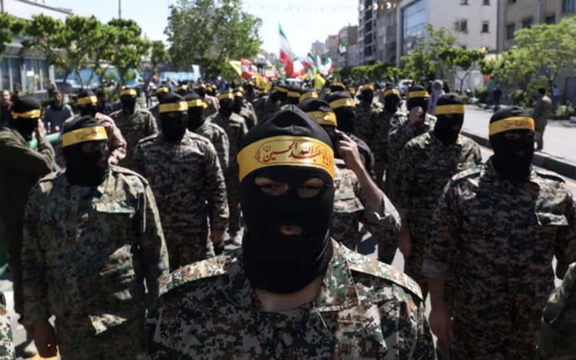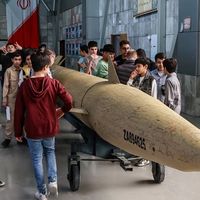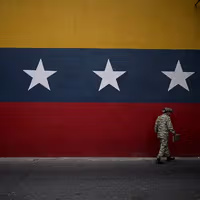EU Urges For Restraint After Airstrike On Iranian Embassy In Damascus
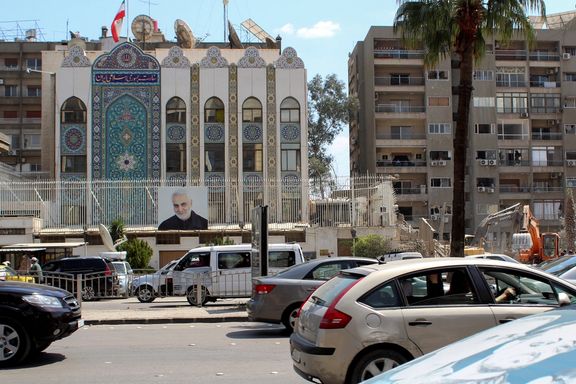
The European Union on Wednesday called for restraint after an airstrike on the Iranian embassy in Damascus killed seven Revolutionary Guards.

The European Union on Wednesday called for restraint after an airstrike on the Iranian embassy in Damascus killed seven Revolutionary Guards.
Iran attributed the attack to Israel, which resulted in the deaths of two of its generals and five military personnel at its embassy compound in Damascus. Israel, however, has not acknowledged responsibility for the strike, which stands as one of the most consequential attacks on Iranian interests in Syria to date.
"In this highly tense regional situation, it is imperative to show utmost restraint," Peter Stano, a spokesperson for the executive European Commission, said in a post on X.
The block also censured the attack saying that “The principle of the inviolability of diplomatic and consular premises and personnel must be respected in all cases and in all circumstances in accordance with international law."
However, some users slam the move by EU saying Europe is continuing to act as the "protective shield" of the Islamic Republic.
Jason Brodsky, policy director for think tank United Against A Nuclear Iran also slammed the EU saying “The European Union is condemning an attack targeting the IRGC terrorists commander Mohammad Reza Zahedi, whom it has sanctioned, and in the process falls hook, line, and sinker for the Iranian fiction that this was a diplomatic compound.”
Iran refrained from engaging in direct conflict with Israel amid the six-month conflict against Iran-backed Hamas in Gaza, while simultaneously backing its allies' strikes on Israeli and US targets.
Nevertheless, Iranian Supreme Leader Ayatollah Ali Khamenei pledged retaliation for the airstrike on Monday, which obliterated a consular building adjacent to the primary embassy complex in Damascus' upscale Mezzeh district which experts say was in fact a military compound.
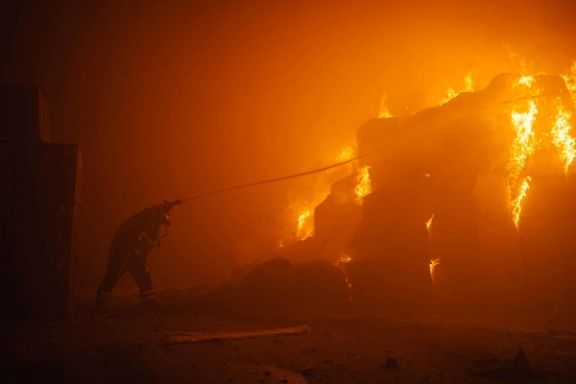
North Korea and Iran's military support to Russia has serious global security consequences that the 32-member NATO alliance cannot ignore, Secretary General Jens Stoltenberg said on Wednesday.
Pyongyang has transferred ballistic missiles and other weapons to Russia, while Iran has also provided Moscow with the supply of Shahed suicide drones, frequently used to attack Ukrainian infrastructure.
In return, Russia has provided technology and supplies that help expand missile and nuclear capabilities of its allies.
Iran has provided well over 1,000 drones since mid-2022, that are often used to swamp Ukrainian air defenses during large-scale missile attacks on civilian targets.
Western powers are increasingly concerned Tehran could soon also transfer ballistic missiles to Russia.
"Russia's friends in Asia are vital for continuing this war of aggression," Stoltenberg said as ministers met in Brussels.
China was also "propping up Russia's war economy," he said.
"This has regional and global security consequences," Stoltenberg said, adding that the ministers would discuss how to handle the issue.
In February, Reuters reported that Iran has provided Russia with a large number of powerful surface-to-surface ballistic missiles, citing six sources, in a sign of deepening military ties between the two US.-sanctioned countries.
While Washington and other Western officials have repeatedly warned Iran against providing such weaponry to Russia, they have not confirmed that Moscow has taken delivery of the missiles.
Both the G7 and the European Council have said that such a step would lead to major consequences in its relations with Tehran and said third parties who provide weapons could also face further measures.
European diplomats have said potential measures on Iran could include targeting Iran Air, banks in Europe and even the possibility of reimposing UN Security Council sanctions as part of a nuclear agreement between Iran and world powers.

NEW IRAN SANCTIONS?
According to five European diplomats, the foreign ministers of France, Germany, Netherlands, the Baltic States, Czech Republic, Denmark and Romania sent a letter on February 19 to EU foreign policy chief Josep Borrell asking for new EU-wide sanctions on Iran.
The new measures would be two-pronged. Further sanctions would target Iran's support of Russia, but there would also be new measures focused on Iranian individuals and companies that arm, finance and train proxies in the Middle East as well as possible sanctions on the groups themselves, the diplomats said.
Initial discussions have taken place at EU level, but some of the 27-member states remain opposed.
According to the diplomats, Borrell responded cautiously to the ministers saying there was an existing legal basis for measures against Islamist militant group Hamas.
He also warned that any new sanctions should be carefully considered to ensure they were legally sound, but also avoided harming its activities in the region, notably in negotiations over Iran's nuclear program, for which the EU is a facilitator.
However, these talks have made no progress since they began in April 2021. Iran has in the meantime accelerated its uranium enrichment, stockpiling enough fissile material for at least three nuclear bombs.
"There is a rather clear triangle with Russia, Iran and North Korea. Both Iran and North Korea supplying weapons and ammunition to Russia, which is then using these weapons and ammunition to try to destroy Ukraine. So that is a very real cooperation, which is a great concern to everyone" Latvia's Foreign Minister Krisjanis Karins.
(With reporting by Reuters)
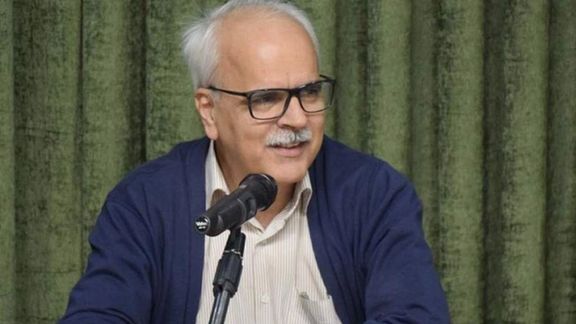
Several high profile political prisoners have voiced condemnation over the recent sentencing of Saeed Madani, a prominent university professor and political activist, to exile.
The prisoners described the action as “a desperate attempt to quell dissent”.
"The sentencing of Madani is a clear demonstration of the authorities' willingness to oppress even non-violent dissenters," said one prisoner.
The statement, released by the prisoners, denounced the government's ongoing systematic suppression of political dissent which has seen hundreds of arrests of academics and students in the wake of the 2022 unrest. Universities have been at the heart of the Women, Life, Freedom movement sparked by the death in custody of Mahsa Amini.
Saeed Madani, known for his involvement in the national-religious movement, faced a nine-year prison sentence in November 2022 on various charges including “forming and managing opposition groups, conspiring against national security, and propagating against the regime.” The Tehran Appeals Court upheld the verdict, with eight years deemed executable.
"Saeed Madani's resilience in the face of adversity is commendable," stated a fellow inmate. "His unwavering commitment to activism despite immense pressure serves as an inspiration to us all."
Among the signatories are Golrokh Iraee, Alireza Eradati, Rasoul Bodaghi, Mostafa Tajzadeh, Mahvash Sabet.

Israel saw a 43% surge in cyber assaults originating from Iran and Hezbollah in the last year, a recent report from Israel’s National Cyber Directorate has revealed.
The annual publication highlights a significant escalation in cyber warfare tactics during the period from the October 7 invasion from Iran-backed Hamas, to the end of 2023.
According to the report, Israel encountered a 2.5-fold increase in cyber intrusions compared to previous years, with a total of 3,380 attacks documented during the specified timeframe. Notably, 800 of the attacks were deemed to possess "significant potential for damage" by the National Cyber Directorate.
"The war brought with it an increase in cyber attacks that intensified gradually, shifting from a focus on information theft to disruptive and damaging attacks," the report stated. It said the attacks had aims from simply spreading public discord to more sophisticated endeavors designed to disrupt essential organizations and influential companies within supply chains.
The Directorate underscored the targeting of hospitals as central objectives, attacks aimed at undermining the war effort and intelligence gathering, and a burgeoning collaboration between Iran and Hezbollah in executing cyber operations.
Throughout 2023, the Directorate registered a total of 13,040 verified cyber attack reports, representing a 43% surge compared to the preceding year. Notably, 68% of these reports coincided with the Gaza conflict.
Of the reported attacks, 41% targeted social networks, 25% were phishing attempts, and 13% exploited vulnerabilities in computer systems. The remaining assaults comprised malware attacks, disruptions to operational continuity, and communication disruptions.
The report also emphasized the prevalent use of compromised login data and phishing techniques by attackers, underscoring the need for heightened vigilance and enhanced cybersecurity measures across critical sectors.
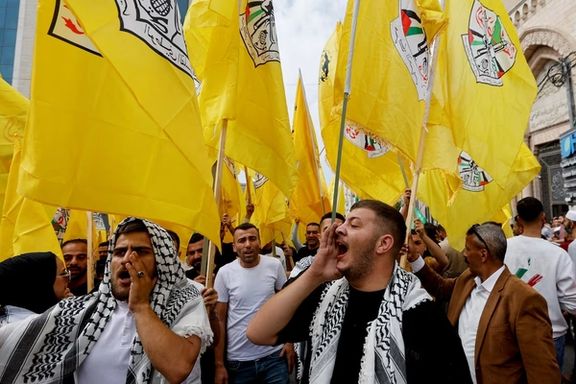
The main Palestinian faction in the occupied West Bank on Wednesday accused Iran of trying to spread chaos in its territory and said it would oppose foreign operations that had nothing to do with the Palestinian cause.
Fatah, the movement that controls the Palestinian Authority, said it would not allow "our sacred cause and the blood of our people to be exploited" and said it would act against any interference from outside aimed at harming security forces or national institutions.
Israel has long accused Iran of helping Palestinian armed groups including Hamas, which led the October 7 attack on Israel, and which has become more deeply entrenched in the West Bank over recent years.
The leaders of Hamas and Islamic Jihad visited Iran last week, attesting to the Tehran's growing influence on Palestinian politics, almost six months after the attack on Israel.
In addition to financial and logistical support, Tehran does everything it can to tilt the balance of power among Palestinian factions away from the Palestinian Authority and towards Hamas and Islamic Jihad, whom, unlike Fatah, Iran considers friends and allies.
Last month, the Israeli military said security forces had stopped advanced weapons including anti tank mines from being smuggled into the West Bank.
In the past, Iran has not denied providing support to the armed groups, saying whatever backing it gives is at the request of the Palestinians.
The statement from Fatah came as the Palestinian Authority has asked the United Nations Security Council to vote this month to make it a full UN member, a move that would add to mounting global pressure for a two state solution with Israel.
Occupied by Israel after the 1967 Middle East war, the West Bank has been at the heart of decades of conflict with the Palestinians, who want the area as the heart of a future independent state that would also include Gaza and have East Jerusalem as its capital.
(With reporting by Reuters)
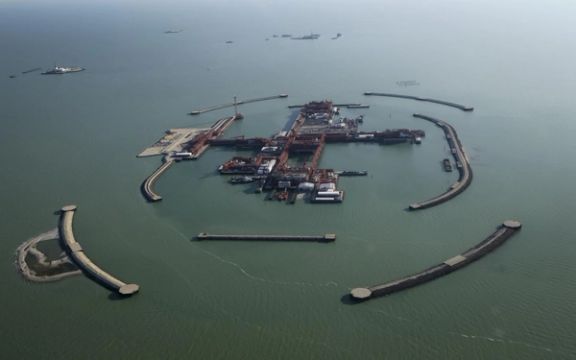
A possible oil spill in Kazakhstan's Kashagan Oilfield has sparked concern in Iran with pollution risks to the country's Caspian Sea coast.
Globus, an environmental organization in Kazakhstan, reported that satellite imagery had detected a significant oil spill in the northern Caspian Sea vicinity of Kashagan. Galina Chernova, director of Globus, shared on Facebook that images from the European satellite Sentinel-1A depicted a slick spanning approximately 7 square kilometers (2.7 square miles).
However, North Caspian Operating Company, primarily owned by Western oil majors such as Shell and Exxon Mobil, overseeing the Kashagan field, dismissed the claims, attributing the satellite images to a different, natural phenomenon.
The oil pollution in the Caspian Sea poses a significant threat to Iran's environment and economy. As one of the Caspian littoral states, Iran is particularly vulnerable to the consequences of oil spills and pollution in the region. The spills not only endanger marine life and ecosystems but also impact Iran's fishing industry, which relies heavily on the health of the Caspian Sea.
The contamination can also affect coastal communities and pose health risks to residents who rely on the sea for their livelihoods.
Iran stands as the sole Caspian Sea littoral state refraining from oil and gas extraction activities, contrasting with Russia, Azerbaijan, and other nations which have collectively invested over $160 billion in Caspian fields.
In 2024, all littoral states, with the exception of Iran, are striving to boost oil and gas production from the fields. Their combined output from the fields amounted to over 1.2 million barrels per day of oil and 50 billion cubic meters per year of gas in 2023.
